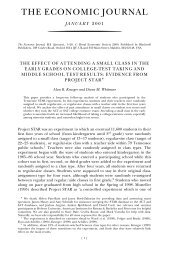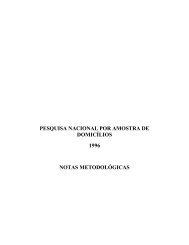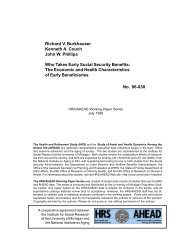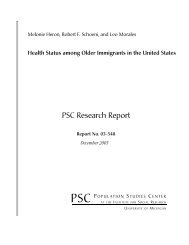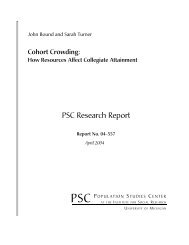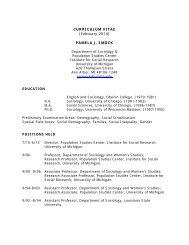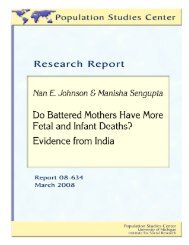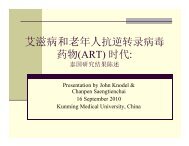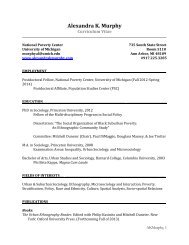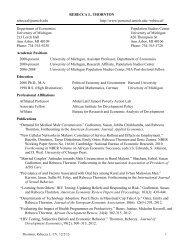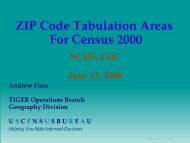1985-1987 - Population Studies Center - University of Michigan
1985-1987 - Population Studies Center - University of Michigan
1985-1987 - Population Studies Center - University of Michigan
You also want an ePaper? Increase the reach of your titles
YUMPU automatically turns print PDFs into web optimized ePapers that Google loves.
COURSES (Cont'd.)Sociology 535 - The Urban Community. Offered occasionally.A descriptive study <strong>of</strong> the form and development<strong>of</strong> the urban community with respect to demographicstructure, spatial and temporal patterns andfunctional organization. Attention is given to the datasources and analytic techniques appropriate to thestudy <strong>of</strong> population distribution and migration.Sociology 536 • Human Ecology and Social Organization.Offered occasionally. Deals with the forms andmodes <strong>of</strong> change <strong>of</strong> social structure as affected byinteractions with the environment and population.Sociology 595. Special Topics in <strong>Population</strong>:Migration and Urbanization. Offered periodically.This course examines the major substantive areas <strong>of</strong>migration research and the relationship betweenmigration and urbanization, drawing from thedemographic, sociological, and geographic literature.It also introduces students to the methods <strong>of</strong> analysisand data that can be used to examine the migrationcomponent <strong>of</strong> population change.Sociology <strong>of</strong> Fertility. Offered periodically. Thiscourse examines major theories and controversiesabout the fertility transition and considers therelevant evidence. Both historical transitions in theWest and contemporary transitions in developingcountries are considered.Sociology 633 - Proseminar in Historical Demography.Offered periodically. A survey <strong>of</strong> the data sourcesand the methods <strong>of</strong> data organization and analysispeculiar to historical demographic research along withselected substantive topics.Sociology 830,831 - Seminars in <strong>Population</strong> andHuman Ecology. Offered periodically. A variety <strong>of</strong>substantive and methodological topics are taken up inseminar format.Economics 466 - Economics <strong>of</strong> <strong>Population</strong>. Offeredannually. Analysis <strong>of</strong> the causes and effects <strong>of</strong> populationchanges from the standpoint <strong>of</strong> economic theory.Economics 667 - The Economics <strong>of</strong> <strong>Population</strong>Growth. Offered annually. Examines the economicdeterminants <strong>of</strong> demographic behavior, emphasizingfertility, and the effects <strong>of</strong> demographic change in bothdeveloped and less developed countries. The economicaspects <strong>of</strong> population policy and family planningprograms are explored also.Economics 867, 868 - Seminar in the Economics <strong>of</strong><strong>Population</strong>. Offered annually. A seminar covering avariety <strong>of</strong> topics in the form <strong>of</strong> (1) a detailed discussion<strong>of</strong> an important recent article or series <strong>of</strong> articles; (2)presentation <strong>of</strong> research plans or findings by traineesor faculty members; (3) presentation <strong>of</strong> research resultsby a visitor.Sociology 630 - Research Methods in <strong>Population</strong> andHuman Ecology. Offered annually. An examination <strong>of</strong>the nature and structure <strong>of</strong> a large number <strong>of</strong> demographictechniques useful for studying populationcomposition or analyzing population dynamics.Involves both review <strong>of</strong> literature and computationsusing the techniques. Topics include life table construction,period and cohort rates, and stable populationmodels. The course involves both review <strong>of</strong>literature and computations using the techniques.Sociology 631, 63? - Advanced <strong>Population</strong> Methods:Indirect Estimation Techniques. Offered periodically.The methods used to detect and correct for the kinds <strong>of</strong>errors found in many data from developing countries,including methods by Brass, Preston, and Coale, areexamined. Occasionally other kinds <strong>of</strong> advancedmethods are emphasized.John Miller and Shubha Ghosh26 <strong>Population</strong> <strong>Studies</strong> <strong>Center</strong>



